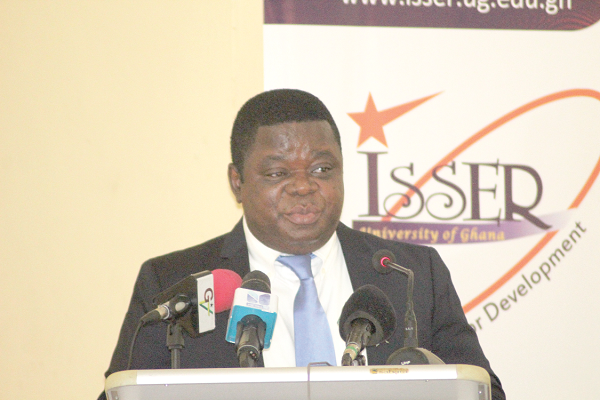The Institute for Statistical, Social and Economic Research (ISSER) of the University of Ghana, Legon has advised the government to resist the temptation to turn to the usual victim - new-taxes - to raise more revenue in the 2022 Budget.
The institute maintained that any attempt to use new or additional taxes to boost revenue would be a nightmare for businesses whose survival had been threatened by the COVID-19 pandemic.
Rather, it said the government should use the budget to introduce policies that would ensure efficiency in the country’s tax administration.
Presenting a review report of the 2021 quarter three economic performance at the University of Ghana in Accra yesterday, the Director of ISSER, Professor Peter Quartey, said the government must ensure tax efficiency with the introduction of improved digitalisation to capture those outside the tax net.
“The Ghana Revenue Authority (GRA) is reported to have collected GH¢39.90 billion out of a target of GH¢57 billion by September 2021, representing 70 per cent of the targeted tax revenue for the year.
“This means that within the next three months, it is likely to exceed its target, and that will be good news.
With the 2022 budget, we should ensure tax efficiency, rather than introducing new taxes targeting the same people,” he suggested.
Three reports - the State of the Ghanaian economy (SGER 2020), the Impact of the COVID-19 pandemic on Ghana 2020-2021 and the COVID-19 business tracker survey in Ghana - were also launched at the event.
The review is an initiative of ISSER, with support from Stanbic Bank, the United Nations Development Programme (UNDP) and the Agricultural Development Bank (ADB).
Nuisance tax
Prof. Quartey said the new tax measures which were introduced in the 2021 budget had yielded GH¢249.7 million in revenue in the first half of 2021 but fell below their programmed target of GH¢358.1 million.
On the other hand, he said, the COVID-19 health and the financial sector clean-up levies seemed to be performing better.
As a result, he called for critical assessment of the taxes to ascertain whether they were efficient means of raising revenue or “nuisance” taxes that stifled private businesses.
He also said debt service payments accounted for 62.1 per cent of domestic revenue in 2020, up from 51.9 per cent in 2019.
In quarter two of 2021, interest payments accounted for about 45 per cent of total tax revenue, he added.
He further said Ghana had recorded appreciable growth rates since 2020, with oil gross domestic product (GDP) of 3.9 per cent and non-oil GDP growth of 5.2 per cent in quarter two of 2021.
Prof. Quartey said growth rates recorded by the government must translate into creating sustainable jobs, adding that increased support to businesses affected by the pandemic would also help accelerate the recovery process.
Timing of reports
The Chief Executive of Stanbic Bank, Mr Kwamina Asomaning, said the timing of the release of the reports was crucial to the drafting of the budget for the 2022 fiscal year.
“I believe that there are a lot of highlights for all stakeholders, including the government, the private and the public sectors, as well as academia.
What these reports mean for economic management is very instructive,” he said.

